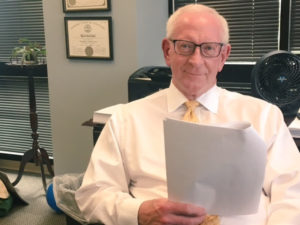 Is Wrong to Get Social Security Disability? | Undoing the Stigma
Is Wrong to Get Social Security Disability? | Undoing the Stigma
As a Memphis Social Security disability insurance lawyer, I occasionally talk with people who seem to think it’s wrong to get Social Security Disability.
Usually, they just don’t understand how SSDI works. But sometimes, these myths come from ableism. Our culture often shows able-bodied people as morally better in some way than people with disabilities. But disability can impact anyone, and it almost certainly will come for all of us with age.
So here’s what you should know about whether it’s wrong to get Social Security Disability, and what to do if you need it.
How SSDI Works
Contrary to popular belief, SSDI isn’t actually a welfare program. It’s an insurance policy that you pay into with every paycheck.
If you’ve ever received take-home pay, you know your employer usually has to take out a certain amount for taxes. These include taxes for Social Security disability.
Essentially, you’re paying for a government insurance plan. Down the road, if anything happens to you and you’re unable to work because of a disability, you have the right to apply and receive money from this policy.
 What Kinds of People Apply for SSDI?
What Kinds of People Apply for SSDI?
Anyone can apply for SSDI, but in order to be successful with your application, you have to have paid into the system already through hard work.
SSDI goes to adults who’ve built up a work history but can’t earn a full income anymore due to a disability.
This can happen in any number of ways. Sometimes people come down with an unexpected illness, sometimes an accident causes disability, and sometimes chronic conditions get worse with age.
Whatever the reason, it’s important to have empathy for anyone who needs disability insurance. These are injuries or health problems that could happen to anyone.
Do People Take Advantage of the System?
There’s no doubt some people apply for disability who don’t need it. However, it would be extremely difficult to be successful and game the system.
First, it’s actually pretty hard to get disability. The SSA denies the majority of claims, and after that you have 60 days to appeal. If your case is bogus, you likely won’t win on appeal in front of a judge.
In addition, attorneys won’t want to help you. Not only do we want to avoid any form of fraud; we also don’t want to take on all the expense of a case that won’t be successful.
Lastly, it can take many months to get your disability claim even if you win. So this would be a very long con: an enormous amount of work for a very unlikely outcome.
 Are People Who Receive SSDI Lazy?
Are People Who Receive SSDI Lazy?
I will also sometimes hear the argument that SSDI makes people lazy. For most people on disability, this couldn’t be further from the truth.
Most of us actually want to work. Despite how we may feel about our jobs, we enjoy accomplishing things.
It can be devastating for people to lose their careers because of a disability. In fact, a lot of people on SSDI actually work part-time. This helps them stay active and supplements their disability benefits, which often aren’t actually very much money.
In addition, some types of disability aren’t visible. A lot of chronic conditions may not look like a disability to most of us, but they can have devastating effects. So even if you think someone should be able to work, you may not know the whole story. It’s best not to judge anyone without the full context.
People who need SSDI are just trying to figure out how to make it in a world that’s become much more difficult for them because of a disability.
 When You Need to Get Social Security Disability
When You Need to Get Social Security Disability
If you need to get Social Security Disability, you want an attorney who understands how disability works and will stand by your side.
Our attorneys have helped hundreds of people get the disability benefits they need, and we can help you too. With a reputation for compassion and respect, we treat our clients like family.
What’s more, we don’t get paid unless and until we win your case. And even that is only a small portion of your past-due benefits. You keep everything moving forward.
To get started, contact us online today or call 901-327-2100.
